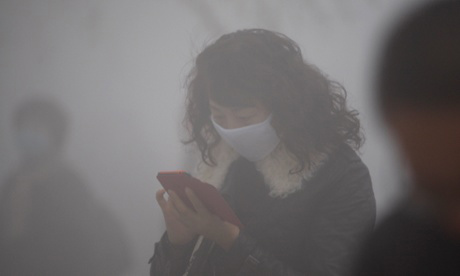在中國,城市籠罩在濃重霧霾里成了司空見慣的情景。2012年冬天,有關北京“空氣末日”(airpocalypse)的報道占據了全球媒體的頭條,在中國國內也引發了不滿和爭論。但在本周,中國東北部城市哈爾濱的大氣污染狀況則刷新了之前北京高污染水平的記錄。
世界衛生組織的國際癌癥研究機構將大氣污染歸為致癌物。據稱,有“充分證據”證實,暴露在大氣污染下的戶外會導致肺癌,而且還會有增加患膀胱癌的風險。
中國霧霾已經廣泛地成為呼吸道疾病的誘因,而且據新華社報道,醫學專家發出警告稱,在哈爾濱高危霧霾之后,需要相關疾病治療的人數將會大增。

Cityscapes shrouded in thick smog have become a common scene in China. Last winter, Beijing's 'airpocalypse' garnered headlines worldwide and generated much anger and debate within China. But this week, air pollution levels in the northeastern city of Harbin surpassed the previous record levels in Beijing.
The city was essentially shut down after PM2.5, fine particulate pollution that is considered hazardous, reached levels of 1,000 micrograms per cubic metre – 40 times the safety level recommended by the World Health Organisation. Schools, motorways and an airport were closed on Tuesday as visibility in some areas of the city dropped to less than 10 metres.
Photos from Harbin showed residents covering their mouths with masks and scarves, moving like ghostly shadows through the fog. Cars and motorcycles moving slowly as traffic came to a standstill with traffic lights barely visible.
Just days previously, the World Health Organisation's International Agency for Research on Cancer (IARC) classified air pollution as carcinogenic. It stated that there is "sufficient evidence" that exposure to outdoor air pollution causes lung cancer and also linked it with an increased risk of bladder cancer. It said that exposure has increased significantly particularly in "rapidly industrial countries with large populations" such as China.
"The air we breath has become polluted with a mixture of cancer-causing substances", Dr Kurt Straif, Head of the IARC Monographs Section said in a press released. "We now know that outdoor air pollution is not only a major risk to health in general, but also a leading environmental cause of cancer deaths."
These findings, while they show the gravity of China's air pollution problem, do not come as a shock to Chinese residents. Increasingly the health implications of pollution have been discussed online in local media.
On the Chinese social media site Weibo, many users complained about the pollution in Harbin and shared their concerns. One user, Wei Bang Zhu, wrote on Tuesday "someone should take responsibility for the smog…the price of pursuing high-speed development is that people end up being fed with smog. To venture out in an environment like this would be equivalent to teasing about one's own health and life."
References to "feed people with smog" have become popular on Weibo and is a sarcastic play on the expression "serve the people" as the two have a similar pronunciation.
Another, Justop88, said: "Too horrible, it's like the end of the world in American movies."
China's smog has already been widely linked to respiratory illnesses and according to the state news agency Xinhua, medical experts warned that there will be an increase in the number of people needing treatment after the high levels in Harbin.
"The impact of air pollution on people will be gradual. There won't be a sudden outbreak of symptoms, but normally three to five days after the smoggy weather occurs, there is a peak in the number of people seeing doctors," Deng Ying, a doctor at the Second Affiliated Hospital of Harbin Medical University was quoted as saying.
Earlier this year it was announced that cancer is the leading cause of death in the capital Beijing. While in Shanghai it was reported that the number of cases of tumors had risen. According to figures from the Health and Family Planning Commission 36,000 people in the city die of cancer a year.
But it is not just China's big cities that are affected by pollution-linked health problems. Earlier this year a report by the Ministry of Environmental Protection linked pollution in rivers to cancer in some villages located close to factories or heavy industry. These are often referred to as 'cancer villages' and it is thought this is the first time they had been officially recognised.
In late September, Xinhua reported on a village in Henan where the groundwater has been badly polluted. The news agency said that locals claimed the deaths of 48 villagers from cancer are linked to the pollution.
Research carried out by Yang Gonghuan, a professor of public health at the Chinese Academy of Medical Sciences has also linked high rates of cancer to polluted river water in Henan, Anhui and Shangdong provinces.
(來源:中國日報網愛新聞iNews 編輯:丹妮)
